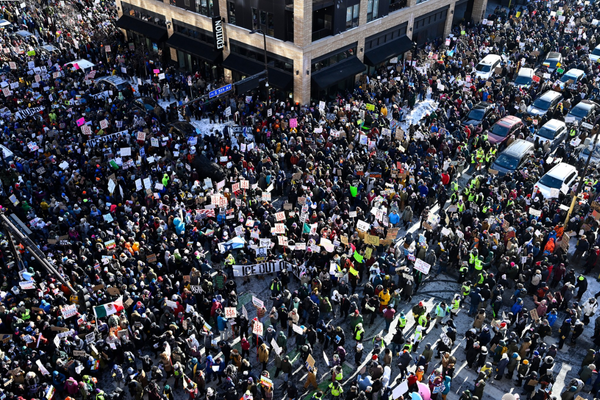
On Saturday afternoon, 27 October 1962, a 19-year-old Juliet Gardiner sat “rigid with fear” in her local launderette reading that day’s news report of Soviet ships heading towards the US blockade around Cuba. She wondered “what on earth was the point of having clean knickers, pillowcases and tea towels, since the world seemed about to end in a nuclear holocaust”. The moment comes early in the latest volume of David Kynaston’s history of postwar Britain, Tales of a New Jerusalem, and typifies its brilliant double vision, between the wide angle and the closeup: world and washing both in a spin. With a beady but compassionate eye, Kynaston ranges over public records and private diaries, political speeches and TV interviews, in conjuring this fresco of the panoramic and the intimate.
Catastrophe was averted and launderettes were safe for now, but there is more trouble brewing in the convulsive years charted here. Much of it chimes weirdly with our present moment. A Conservative government was clinging on, 13 years in power and humiliated by scandal (Profumo instead of Partygate), while Labour, ahead in the polls under Harold Wilson, was sitting pretty for the next general election. France thought Britain too “insular” for membership of the EEC, and De Gaulle slammed the door on Macmillan. The PM’s verdict in 1957 that we’d “never had it so good” was looking doubtful in the face of a continuing north-south divide. Despite improvements, poverty was chronic and the guardians of the welfare state weren’t often reliable in judging who needed help the most. In short: “Victorian values had never quite gone away.” It’s also plus ça change with the railways; where we have the debacle of HS2, back then, a third of the rail network was about to disappear under Beeching’s cuts; more than 2,000 stations closed and once-thriving industrial towns were “left behind”. Meanwhile, a different travel chaos hit Bristol when a boycott followed the city bus company’s refusal to employ minority ethnic crews, one of several race flashpoints of the early 1960s; Kynaston highlights prejudice (and cowardice) at every level.
Cheerfulness keeps breaking through the gloom, albeit often coated in irony. On telly – coming into its own as the whizzy new medium – The Likely Lads and That Was the Week That Was were building an audience. Soon would follow the debuts of Doctor Who, Ready Steady Go!, Top of the Pops and, in August 1964, Match of the Day (from Anfield, Liverpool beating Arsenal 3-2). Alf Ramsey, the new England manager in 1963, predicted national triumph at the World Cup three years hence. In the week that Joan Littlewood’s satirical revue Oh, What a Lovely War! opened in Stratford, London, the Profumo scandal burst into view, prompting Philip Larkin to share the latest joke in a letter to Monica Jones: “Christine Keeler’s newspaper order? – one Mail, one Observer, and as many Times as possible.” But the most significant noise rising from these pages is the music of the Beatles, and the screaming of teenage girls wherever “the Fabs” happened to appear. Kynaston’s own obsession with the band is palpable: in the index alone they rate 23 lines of references (Macmillan gets nine; the Stones get four) with fervour uppermost among the diarists (“the songs were somehow so moving”).

Perfectly reasonable, I should say, and it helps relieve a certain dispiriting mood that tends to settle on the book. For despite the talk of aspiration and prosperity common to the era, A Northern Wind is a chill reminder of calamitous social management, not least in the replacement of solid Victorian terraces by high-rise housing. Kynaston notes that even then, some were having second thoughts about this modernist dream, with its emphasis on style and impact overlooking the needs of the prospective tenants. Not much to cheer in education, either, where the continuing unfairness of the 11-plus, the unloveliness of secondary moderns and the “barrier to democracy” represented by private schools kept British society more or less benighted. “Ultimately,” writes Kynaston, “this was an issue about social class.” It always is. The 1960s was still a conservative age, still hidebound by deference at one end of the class spectrum and complacent in its privileges at the other. Billy Liar (1963) is identified as a key film of the time, a passionate reaction against the forces of northern “prejudice, intolerance, prudishness”, with men like Billy, by refusing the chance to escape, doomed to become just as inward-looking as their parents. In the end it’s Billy’s girl Liz (Julie Christie) who makes the break, a clarion call to women, though one that was agonisingly slow to catch on. For now there were outliers of independence, in Katharine Whitehorn’s forthright columns at the Observer and in novelists who took the social temperature: “the days are over, thank god, when a woman justifies her existence by marrying” (Margaret Drabble).
The book concludes on two seismic moments, one a beginning, one an ending. Labour’s election victory in 1964 was not the landslide expected, but a majority of four: thus, a country still suspicious of change. The latter was the death of Churchill, at 90, in January 1965, which few would dispute as the passing of an era. His funeral at St Paul’s brought London to a standstill and the country to a reckoning. It marked “the final act in Britain’s greatness”, wrote one journalist, who also called it “a gesture of self-pity”; “sobering”, wrote an elderly diarist, “but we have been pronounced dead before and been buried and there has been a resurrection”. It is characteristic of Kynaston to present such opposing views and somehow to harmonise them. He is the most humane and even-handed chronicler of our time, and the one best qualified to carry this mightily compelling national story onwards.
• This article was amended on 31 October 2023. An earlier version said that the news report of Soviet ships heading towards the US blockade around Cuba was on 27 October 1963, instead of 1962.
A Northern Wind: Britain 1962-1965 by David Kynaston is published by Bloomsbury (£30). To support the Guardian and Observer order your copy at guardianbookshop.com. Delivery charges may apply






